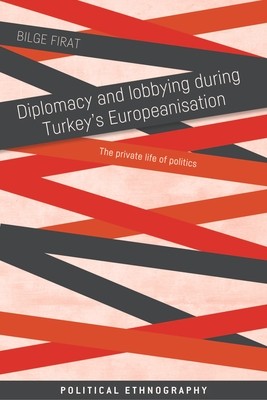
- We will send in 10–14 business days.
- Author: Bilge Firat
- Publisher: Manchester University Press
- ISBN-10: 1526163683
- ISBN-13: 9781526163684
- Format: 15.6 x 23.4 x 1.2 cm, softcover
- Language: English
- SAVE -10% with code: EXTRA
Diplomacy and Lobbying During Turkey's Europeanisation (e-book) (used book) | bookbook.eu
Reviews
Description
Turkey's Europeanisation saga, began in 1959 and climaxed in 2005 following the opening of membership negotiations with the European Union (EU). The process presents a unique opportunity to understand how interstate actors negotiate their interests; what 'common interests' look like from their historically and culturally contingent perspectives; and what happens when these actors work on behalf of private, professional, public, personal or institutional interests, even when those interests may go against their mandate.
Honing in on the role of diplomats and lobbyists during negotiations for Turkey's contentious EU membership bid, this book presents the intricate, backstage conflicts and compromises that drove this candidate country both closer to and further from the EU. Inside the reader will find the everyday actors and agents of Turkish Europeanisation and learn what their work entails, which interests they represent and how they do what they do. Based on long-term ethnographic fieldwork in Brussels, the book argues that public, private and corporate actors voicing economic, political and bureaucratic interests from all corners of Europe sought access to markets and polities through the Turkish bid instead of fulfilling their mandate to facilitate Turkey's EU accession. Although limited progress was achieved in Turkey's actual EU integration, diplomats and lobbyists from both sides of the negotiating table contradictorily reaffirmed their expertise as effective negotiators, earning more recognition, status and power.
This project represents the first book-length account of the EU-Turkey power-interest negotiations in situ and as seen from the perspective of its long-term actors and agents.
EXTRA 10 % discount with code: EXTRA
The promotion ends in 18d.20:03:53
The discount code is valid when purchasing from 10 €. Discounts do not stack.
- Author: Bilge Firat
- Publisher: Manchester University Press
- ISBN-10: 1526163683
- ISBN-13: 9781526163684
- Format: 15.6 x 23.4 x 1.2 cm, softcover
- Language: English English
Turkey's Europeanisation saga, began in 1959 and climaxed in 2005 following the opening of membership negotiations with the European Union (EU). The process presents a unique opportunity to understand how interstate actors negotiate their interests; what 'common interests' look like from their historically and culturally contingent perspectives; and what happens when these actors work on behalf of private, professional, public, personal or institutional interests, even when those interests may go against their mandate.
Honing in on the role of diplomats and lobbyists during negotiations for Turkey's contentious EU membership bid, this book presents the intricate, backstage conflicts and compromises that drove this candidate country both closer to and further from the EU. Inside the reader will find the everyday actors and agents of Turkish Europeanisation and learn what their work entails, which interests they represent and how they do what they do. Based on long-term ethnographic fieldwork in Brussels, the book argues that public, private and corporate actors voicing economic, political and bureaucratic interests from all corners of Europe sought access to markets and polities through the Turkish bid instead of fulfilling their mandate to facilitate Turkey's EU accession. Although limited progress was achieved in Turkey's actual EU integration, diplomats and lobbyists from both sides of the negotiating table contradictorily reaffirmed their expertise as effective negotiators, earning more recognition, status and power.
This project represents the first book-length account of the EU-Turkey power-interest negotiations in situ and as seen from the perspective of its long-term actors and agents.


Reviews